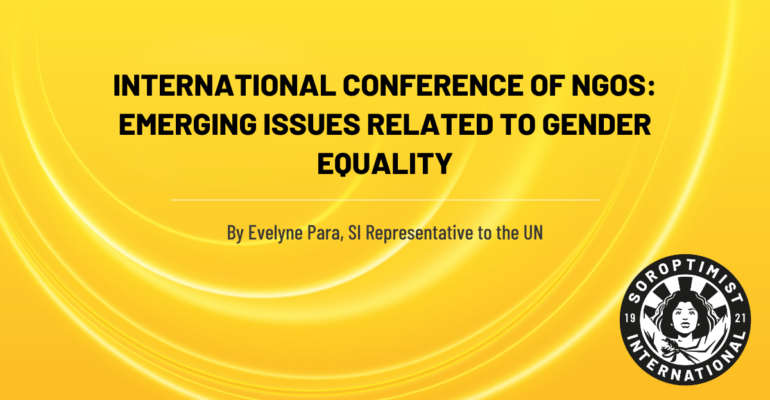Blog of Evelyne Para, SI Representative to UNESCO, Paris.
UNESCO has made gender equality a priority throughout its mandate, because it must be said that the current situation in the world remains worrying. Not only is progress too slow, but the Covid-19 pandemic, or the situation in Afghanistan where girls and women have been brutally deprived of their right to learn and teach, have led to major setbacks.

This is why, under the general theme “Strengthening capacities for action“, the International Conference of NGOs in official partnership held at UNESCO Paris on 17, 18 and 19 December 2024, devoted one of its sessions to “Emerging Issues Related to Gender Equality“.

This session was moderated by H.E. Christina Kokkinakis, Permanent Representative of the European Union to the OECD and UNESCO; Delphine O, Ambassador, Secretary-General of the Generation Equality Forum (Beijing + 25); Begona Lasagabaster, Director of the Division of Gender Equality at UNESCO; Bhavani Rao R., Dean of the School of Social and Behavioural Sciences and Director of AMMACHI Laboratories (in India); Odipo Sharola, Founder and President of Women in AI in Africa; Keithlin Caroo, Founder of Helen’s Daughters (in Saint Lucia). They were able to develop this theme and provide their testimonies on the implementation of certain programs conducted by UNESCO.
I am pleased to present you a short summary of this session that highlights the projects and programs implemented by UNESCO and its partner NGOs.
The first challenge is to measure gender inequalities, because having reliable and accurate data is necessary to inform public action. Let us recall some of these figures.

For example:
– 122 million girls, or about 1 in 5, are not in school;
– 63% of the 763 million illiterate adults are women;
– 1 additional year of schooling can increase the income earned by a girl who becomes an adult by 20%;
– Some countries lose more than $1 billion per year by not offering girls the same level of education as boys;
– Women represent 94% of preschool teaching professionals, 67% in primary education, and 44% in higher education;
– Only 1/3 of higher education graduates in STEM fields are women
The second challenge is action. For several years, UNESCO has been supporting dozens of countries to review their gender legislation or strategies in and through education. The aim is to ensure equitable access to quality, gender-transformative education and to reduce gender gaps in completion rates and learning outcomes.
UNESCO also works for gender equality in science, supporting more than 145 countries to promote science education for girls. It strives to promote opportunities for women and girls to pursue careers in science, particularly with a view to protecting health and the environment. It highlights role models and mentors for young scientists and seeks to empower them to use their knowledge to support the sustainable use of natural resources and heritage.
UNESCO also supports talented women researchers, half of whom are from developing countries, as well as women scientists throughout their careers, notably through the L’Oréal-UNESCO Prize for Women in Science.
Many projects supported by UNESCO ensure that women and girls are at the forefront of actions to preserve ecosystems and protect biodiversity. This is the case, for example, of the World Water Assessment Programme, which focuses on the needs of women and girls in light of the impacts of extreme climate conditions, particularly in terms of sanitation.

In addition, UNESCO is actively engaged worldwide in bridging the gender digital divide by providing women and girls with media and information literacy and digital skills.
New projects are being carried out to promote gender equality in the development and use of digital technologies. This includes developing and implementing ethical standards and common principles to address biases and barriers that hinder women and girls’ full participation and empowerment in the digital world, including in the field of artificial intelligence (AI).
To conclude, and in line with this theme which invites us to reflect on the impact of technologies on education, it is interesting to note that on the occasion of the International Day of Education on January 24, 2025, the chosen theme is “AI and education: preserving autonomy in an automated world”.

